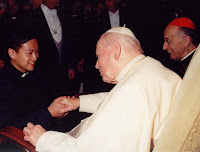
Sometimes, it does help to look at things which we oftentimes take for granted. In my office I am keeping a copy of the Bosconian’s Daily Guide (more popularly known as the Student’s Diary). The importance of the Daily Guide cannot be questioned--it serves as the link between the school and the home; it includes a lot of features that are valuable especially to each student who bears a copy. I myself found it thus when I was a student. However, the copy that keep in the shelf of my office is meant simply to instruct others how to use it or to serve as a ready reference with regard to the student guidelines.
Two days ago I was idly browsing through the pages of the Diary. July 20 read: “1969. Humankind first landed on the Moon. Neil Alden Armstrong, Edwin E. Aldrin Jr., and Michael Collins were aboard the space shuttle Apollo 11 for this historic lunar mission. At exactly 10:56 p.m. EDT, Armstrong stepped onto the surface of the Moon.”
I was not yet born when that great event was seen on live television. History tells us that on becoming the first person to set foot on the moon, Neil Armstrong declared: “That’s one small step for man, one giant leap for mankind.”
Our lifetime has seen a lot of steps—and leaps—in terms of space exploration, inventions, and other scientific achievements. Our generation never imagined that we would get this far so quickly. This is true not only in science but in other fields as well. There is a revolution not only in the world of action and inventions, but also in the world of speculation. Precisely, what we see manifested in the outside is what is happening in the human person. It is a revolution of the mind. Philosophical movements have never been so many at a given point.
Two days ago I was idly browsing through the pages of the Diary. July 20 read: “1969. Humankind first landed on the Moon. Neil Alden Armstrong, Edwin E. Aldrin Jr., and Michael Collins were aboard the space shuttle Apollo 11 for this historic lunar mission. At exactly 10:56 p.m. EDT, Armstrong stepped onto the surface of the Moon.”
I was not yet born when that great event was seen on live television. History tells us that on becoming the first person to set foot on the moon, Neil Armstrong declared: “That’s one small step for man, one giant leap for mankind.”
Our lifetime has seen a lot of steps—and leaps—in terms of space exploration, inventions, and other scientific achievements. Our generation never imagined that we would get this far so quickly. This is true not only in science but in other fields as well. There is a revolution not only in the world of action and inventions, but also in the world of speculation. Precisely, what we see manifested in the outside is what is happening in the human person. It is a revolution of the mind. Philosophical movements have never been so many at a given point.
The field of education where I find myself right now is exactly moving in the same direction. There are a lot of innovations, not only in terms of being able to use modern means in delivering the same lessons, but also in the process itself--in the mechanics: from planning the lesson to the delivery itself. At this point, let me say as I encourage all those in the teaching profession: the efforts that you exert in this line may be small steps to your estimate, but they are giant leaps after all. Yes, sometimes it does help to look at things which we oftentimes take for granted.

1 comment:
Education has been evolving since the past years, and these years are the leaps. But as leaping distances are also like the many small steps, education evolves in every encounter with your students, in and out of class.
Post a Comment